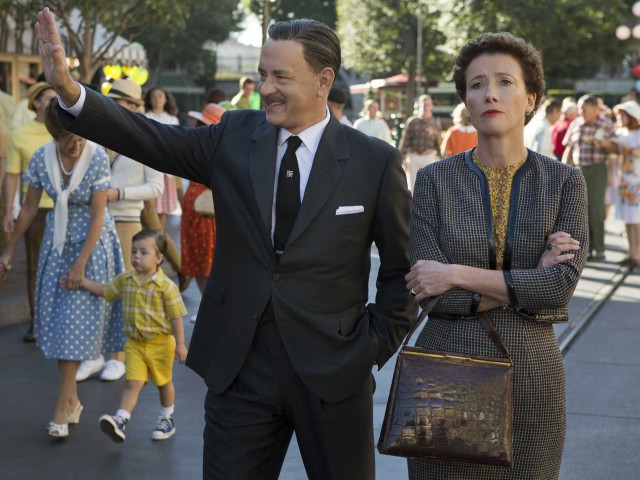
‘Saving Mr. Banks’ teaches a bad lesson
Director John Lee Hancock isn’t Joseph Goebbels or Leni Riefenstahl by any stretch, but Saving Mr. Banks is as close to corporate propaganda as can be legally released in theaters. A Walt Disney Studios movie about Walt Disney (Tom Hanks) making a Walt Disney Studios movie, the take-home message is that a woman who doggedly protects a deeply personal work of art is a cranky bitch who should just give Mickey Mouse what he wants.
Emma Thompson, who single-handedly moves this pic from “oh, hell no” to nearly tolerable, plays P.L. Travers, the creator of Mary Poppins. To believe screenwriters Kelly Marcel and Sue Smith is to believe Travers was an insufferable terror prone to tantrums and was foolishly insistent on maintaining control of her intellectual property instead of letting a stranger do whatever he wanted to it. Through flashbacks, we see that her father (Colin Farrell) was a troubled alcoholic and that his suffering and the suffering he inflicted was the catalyst for the creation of Mary Poppins.
But who cares about Travers’ personal pain? Walt Disney promised his daughter he’d make her a Mary Poppins movie, dammit! For 20 years he relentlessly stalks Travers. Until one day, financially desperate and at her lowest point, Travers sadly reconsiders. She demands final approval, in a move depicted here as completely unreasonable. So she must listen to the Sherman Brothers (B.J. Novak and Jason Schwartzman) write songs, despite her desire that the film not be a musical; must read storyboards for dancing cartoon penguins, when she asked for no animation; and gets mocked by every man she meets. Yet somehow Hancock and company play Travers’ weeping at the film’s premiere as a triumph.
A biopic is not a fact-checked biography, but the truth should matter. The real Travers had an adopted son; in the film, she denies having children. The real Travers had various significant romantic relationships with both men and women; can’t have that in a Disneyfied Disney story about Disney’s brave conquest to save the children by delivering Mary Poppins from her evil creator! The real Travers wept at the premiere out of depression and fury, a fact supported by her refusal to ever work again with Disney.
Hanks is serviceable as Disney, stripped of his well-known anti-Semitism and shown to be a gentle guardian of good. Thompson, on the other hand, finds a way with only gestures and expressions to demonstrate humanity deprived her by the script. Ultimately, Saving Mr. Banks is a “piss off ” to creative types. It turns an artist into a brutal captor selfishly keeping a character caged. In some ways, this is almost a horror film. Did Travers suffer for the next 32 years, watching as a creation she loved like family faded into the shadow of a movie she hated? Mary Poppins as a film is a nearly flawless classic; but Saving Mr. Banks is emotional manipulation intended to excuse the blackmail-based commodification of one woman’s dream.
—This review first appeared in The Reader of Omaha, Neb.
Respond: [email protected]














